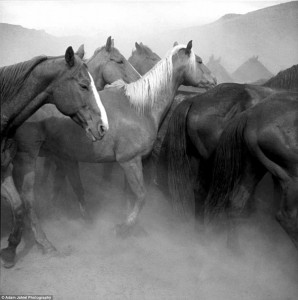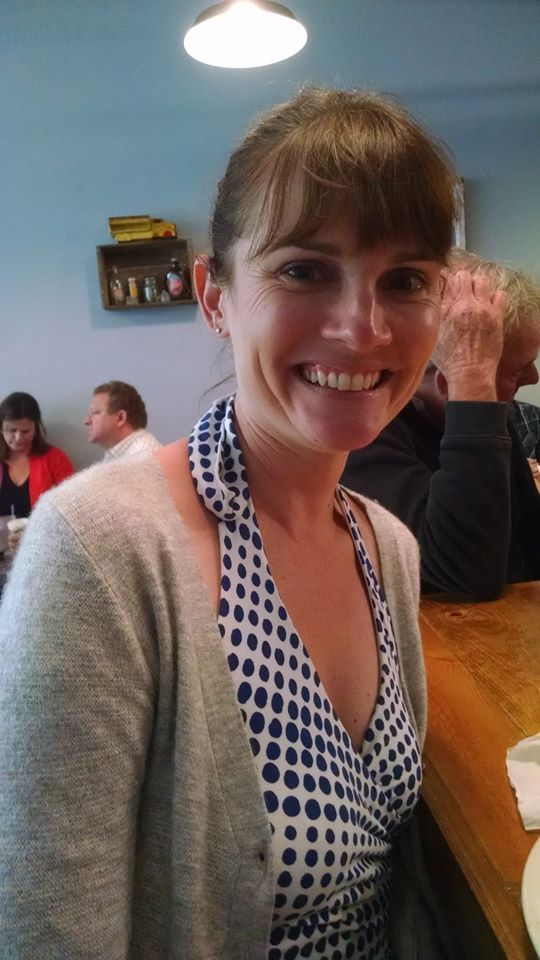Mrs. Blackwell’s face was wide, like a butterfly, but her eyes were small and slightly unkind. The flat planes of her cheeks began and ended with their blueness and ire. I didn’t like meeting Mrs. Blackwell’s gaze, so whenever I went to the school library, I avoided her and kept her in my peripheral vision.
Mrs. Blackwell always dressed in navy pant-suits and sat at a broad desk in the center of the room. The desk was barren except for a binder or two, but this was the era before personal computers, so every desk was like this. A place to sit. A place to type or tabulate. If you had nothing to type or tabulate—and if you were a woman, especially if you were a woman—its emptiness yawned in front of you. Perched there, Mrs. Blackwell reminded me of a captain on a stalled ship, grimly eying the horizon.
At some point between Creation and the year I entered kindergarten, Mrs. Blackwell had catalogued the known world into Units. The Units sat in folders on a shelf, labeled in her clear hand: “Ants,” “Fish,” “Amphibians,” “Metric Measurements.” The Units never changed and they had an inviolable order. If you came to the library you were supposed to study the Units, which meant taking down the next folder in succession and bringing it to Mrs. Blackwell, who would supply you with a worksheet and film strip to watch. The film strips held the answers to the questions on your worksheet. For example, studying “Ants,” one of the first Units, you might click to a slide that showed a glistening red insect and announced, “Ants have a head, thorax, and abdomen.” Then you would fill in the corresponding blank on the worksheet that asked about the three body parts of the ant. Head, thorax, abdomen.
It was rote learning at its finest. And those film strips—how to describe them to today’s children, whose gentlest touch onscreen can kindle fireworks, pies, and flying birds! The films curled like snakes and snapped at your hands as you fed them into the machines. Their images were cracked. Their voices droned. They emitted an urgent bing, indicating a new slide, that to this day could startle me rigidly awake.
 I must have dozed off a lot, because I never made it past the lower rungs of evolution. All I wanted to study was Horses, but first I had to progress through thirty or more Units devoted to Bees, Fish, Amphibians, Reptiles, and Weather. I remember hungrily asking about the Unit on equines and being shown where the tan folder stood, so high on the shelf it would have given me a nosebleed to climb to it. I remember Mrs. Blackwell’s short white finger, her expression of vindictive triumph.
I must have dozed off a lot, because I never made it past the lower rungs of evolution. All I wanted to study was Horses, but first I had to progress through thirty or more Units devoted to Bees, Fish, Amphibians, Reptiles, and Weather. I remember hungrily asking about the Unit on equines and being shown where the tan folder stood, so high on the shelf it would have given me a nosebleed to climb to it. I remember Mrs. Blackwell’s short white finger, her expression of vindictive triumph.
Mrs. Blackwell didn’t hate me personally. She hated the whole messy, snotty, careless lot of us who trooped through her room and ruined her tidy system of knowledge. In her fifties, Mrs. Blackwell was from the last generation of American women who felt compelled to choose jobs in schools or hospitals if they worked outside the home. She was a blip in history—a female caught in the lingering shackles of gender expectation. Sometimes I wonder if she envied us little girls daydreaming our way through the same Units as the boys, almost as likely to be doctors or lawyers or engineers as they. But I prefer to think she didn’t believe such transformations were possible, and this was what made her so inflexible with all the kids at our lower-middle class school. Ants. Fish. Humble creatures that crawled and swam should not be preempted by gallopers.
One day I strayed to a section of chapter books just beyond the kindergarten shelves and was flipping my way through an illustrated copy of Mutiny on the Bounty when I had a sudden and strong urge to pee. I froze. I wasn’t quite sure where the bathroom was and I didn’t want Mrs. Blackwell to take me. So I stood there, staring at an ink drawing of defiant sailors wrapping their officers in chains until the urine poured from me in giant splashes. When the flow stopped, I moved away from the wet spot in the carpet, and hid, staring at the word MUTINY, until some gentle parent-volunteer came and found me.
“Oh, Maria, come here,” she said. I took her hand, sodden and relieved, and left the dark stain behind, a gift and a debt to my first librarian.
I never got to Horses with Mrs. Blackwell because a few years later my family moved to the country, where I encountered in wild profusion the insects and little critters of her Units. Robins and grosbeaks appeared in March and April. Trout flickered in the brook’s green pools in June.
Our barn also housed a real equine: a quarter horse. King was nineteen and his owner paid us a small monthly fee to board him. His red-brown height and musky scent filled his stall in winter; in spring he haunted the corners of his paddock and ripped up clover with mildewed incisors. Whenever I rode him, King shied from down-hills and charged the up-hills, sometimes tossing me off.
I had seen the bitter, impersonal dislike in King’s eyes once before, and recognized it. So did my parents. They blamed his sullenness on his long succession of absentee owners. I was told that if someone like me had really loved and raised King as an individual, he would be a different horse. Sometimes, walking the fields to the barn to do my chores, I imagined those lost autumns and springs, nursing a rickety colt, tossing the first harness over his head, my pockets stuffed with carrots. Other times I watched the bees collecting pollen from the cornflowers, and the ants digging their tunnels beneath, and it seemed to me like the world and life could possess a beautiful logic.
But when King’s owner offered to sell him to us cheap, I led the refusal to buy him. Won’t it end up costing too much? I said.
In truth, I didn’t especially like rising early to chip the ice from King’s water bucket, or grooming his mud-crusted coat. I preferred lying in my soft bed, reading my books from the library.

 Like most writers, I was an avid reader as a child. Even though I couldn’t tell you the name of most of my college professors, I can easily summon a mental picture of my elementary school librarian, Mrs. Blair. To this day when I read a story set in a library, even a decidedly grown-up story about librarians such as Aimee Bender’s Quiet Please, I still summon a mental picture of my elementary school library. (But not Mrs. Blair because that just feels wrong. If you’ve read the Bender story, you’ll understand why.)
Like most writers, I was an avid reader as a child. Even though I couldn’t tell you the name of most of my college professors, I can easily summon a mental picture of my elementary school librarian, Mrs. Blair. To this day when I read a story set in a library, even a decidedly grown-up story about librarians such as Aimee Bender’s Quiet Please, I still summon a mental picture of my elementary school library. (But not Mrs. Blair because that just feels wrong. If you’ve read the Bender story, you’ll understand why.)
